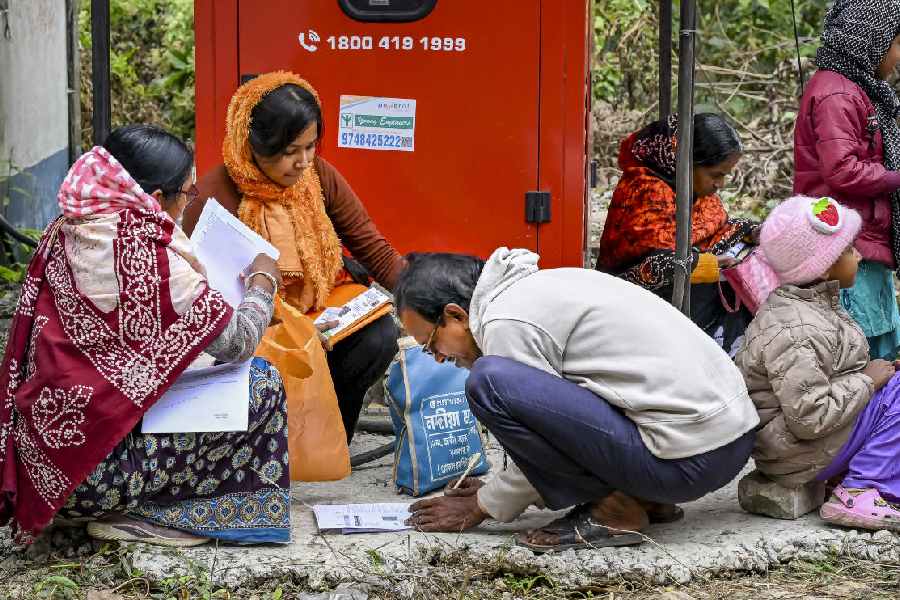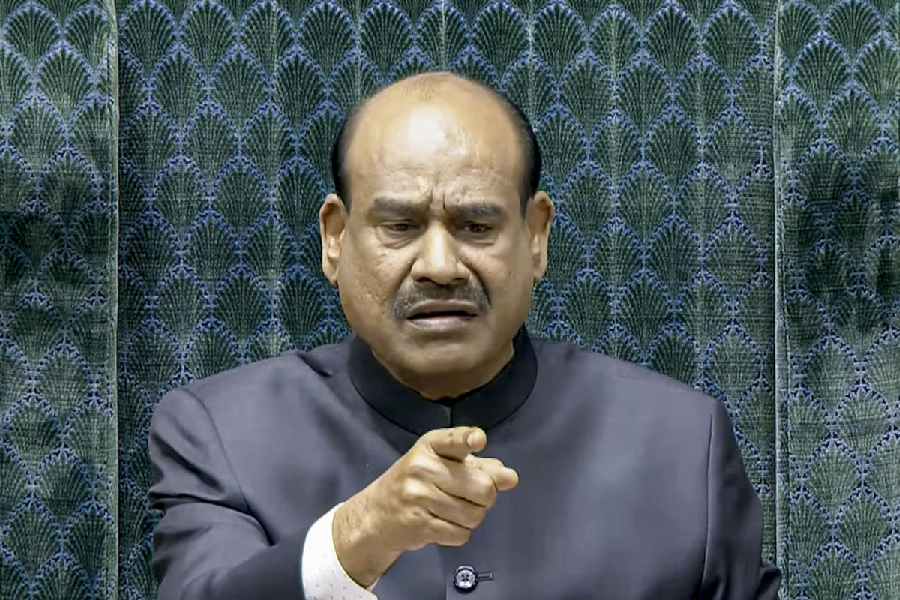 |
| Chief minister Nitish Kumar (right) shakes hands with Opposition leader Abdul Bari Siddiqui before The Telegraph Bihar Debate 2011 at Maurya on Thursday. Picture by Deepak Kumar n See Metro |
What: The Telegraph Bihar Debate 2011 at Maurya
Motion: In the opinion of the house, caste is no longer relevant in Bihar politics
Verdict: Motion defeated
Patna, March 3: The argumentative Biharis were there in full strength, agreeing to disagree on almost all counts. But paradoxically, the final verdict was near-unanimous — caste is a reality while casteism is a disease that needs to be eradicated through social and land reforms, women empowerment and change in societal outlook.
The consensus among panellists Syed Shahabuddin, Anurag Thakur, Shakeel Ahmad, Nalini Singh, Shaibal Gupta, Ali Anwar, Abdul Bari Siddiqui and Bihar chief minister Nitish Kumar was not only significant but it indicated the change 99-year-old Bihar is witnessing since its separation as a province from Bengal and Orissa in 1912.
 |
The first edition of The Telegraph Patna debate had all the colours of a well-contested battle. In keeping with the cricket season, the final outcome of the debate -- “In the opinion of the house, caste is no longer relevant in Bihar politics” -- came almost to a tie.
The Telegraph’s Sankarshan Thakur, the moderator and a cricket enthusiast, quickly made a referral. The revised verdict saw nays having their way. The age-old shackles of caste seemed too strong to break a barrier through a lively debate.
Chief minister Nitish opened the debate in favour of the motion. Nitish termed his second-term electoral victory in Assembly polls a strong signal of change. “Bihar has left caste behind. The verdict in the elections is the people’s stamp of approval for that ending.”
The JD (U) leader was a bit under the weather but his spirits were high, arguing passionately that Bihar has shown that development can win elections. The results will not only change Bihar but it will also have its reverberation outside the state,” he said. The thrust of Nitish’s argument was that massive women’s participation in the JD (U)-BJP combine’s victory was a testimony that caste was no longer relevant in politics.
“Women have voted in unprecedented numbers — this shows our progress. For the first time in Bihar’s history, women outnumbered the men in casting their votes with 54.85 per cent women voting against 50.7 per cent men. The youth is also key to the direction Bihar chooses,” the chief minister said, throwing an open challenge to the Congress, RJD and others.
“You keep believing caste as basis of everything and you will keep losing your relevance,” he told the Opposition, claiming that way back on August 9, 2009, he had predicted that voters in Bihar would cut across caste barriers to usher in naya daur (new age).
The chief minister said that early in 2010, he sensed that voters wanted to get rid of a caste-ridden society with “Bihari pride”. “The only identity now is that of a Bihari and all other lesser identities will get subsumed by it. The only other identity will be that of an Indian.… a good Bihari will be a good Indian,” he said.
While acknowledging that caste will not be eradicated completely, the chief minister said: “The new generation (those below the age of 50) is guided by new aspirations. There is no guarantee that caste will be completely done away with. But we will work in such a way that it will weaken caste equations and a better identity of being Bihari will replace it,” he said.
The chief minister was, however, ably checked by journalist Nalini Singh. She reeled out statistics to show that the number of voters supporting Nitish’s plank of “caste as no longer a factor” was far fewer than those who voted against the JD (U)-BJP combine.
AICC spokesperson Shakeel Ahmad also offered many cogent arguments to pick holes in Nitish’s formula. It was a pity that the chief minister was not there because of ill health when Ahmad and Abdul Bari Siddiqui spoke.
Ahmad wondered why the JD (U)’s success rate of 83 per cent was less than 90 per cent of the BJP if caste was not a factor in the last round of Assembly polls. Ahmad claimed that many upper caste voters opted for the BJP but remained less enthusiastic about the JD (U).
 |
Ahmad said the chief minister’s formulations were in keeping with his “raj dharma” of acknowledging all sections of society as his voters.
While praising Nitish, the Congress leader took on Lalu Prasad for violating “raj dharma” when as chief minister, he had claimed to represent Muslims and Yadavs. “That was a major folly for which Lalu and his party had to pay a price,” Ahmad said.
The Congress spokes- person accused Nitish of “political opportunism” in first siding with forces of social justice, consolidat- ing his hold among other backward classes and Mahadalits.
The otherwise firebra- nd Shahabuddin sounded reasonable and restrained. He made a strong case for relevance of caste on the basis of its social relevance. “Like race, caste is a social reality and has deep roots in history, psychology and politics,” the bureaucrat-turned-politician said.
The veteran politician, whose daughter Parve- en Amanullah is a minister in Nitish’s government, contended that upper and backwa- rd castes were occupying most berths in the state cabinet.
“If they are holding 21 out of 31 cabinet berths, where is the equitable distribution and fair representation,” Shahabuddin asked, adding, “It is too early to write the obituary of caste system in Bihar.”
The former Janata Dal leader suggested land reforms, eradication of caste-based names and inter-caste marriages as some of the effective measures.
Leader of the Opposition Abdul Bari Siddiqui, too, said the true measure of caste-less society in Bihar would be if ministers stop keeping their fellow caste mem- bers as their private secretaries.
Ali Anwar of the JD (U) was refreshing. He argued that even in Muslim society, there was widespread casteism which, he insisted, was not because of Hindu influence.
Quoting from the Quran and instances from the life of Prophet Mohammad, Anwar said that in theory and spirit, Islam has oppos- ed the idea of caste-based division.
Anurag Thakur, the young BJP MP and the only “non- Bihari” in the panel, claimed that the BJP-NDA ruled states like Bihar, Gujarat, Madhya Pradesh, Himachal and others were offering a viable alternative of developmental model.
“It is all due to our inclusive model of growth. The Bihar story is a new script in the politics of developme- nt. For the first time, the institution of caste has been challenged and its role in politics minimised,” said the MP from Himachal Pradesh.










